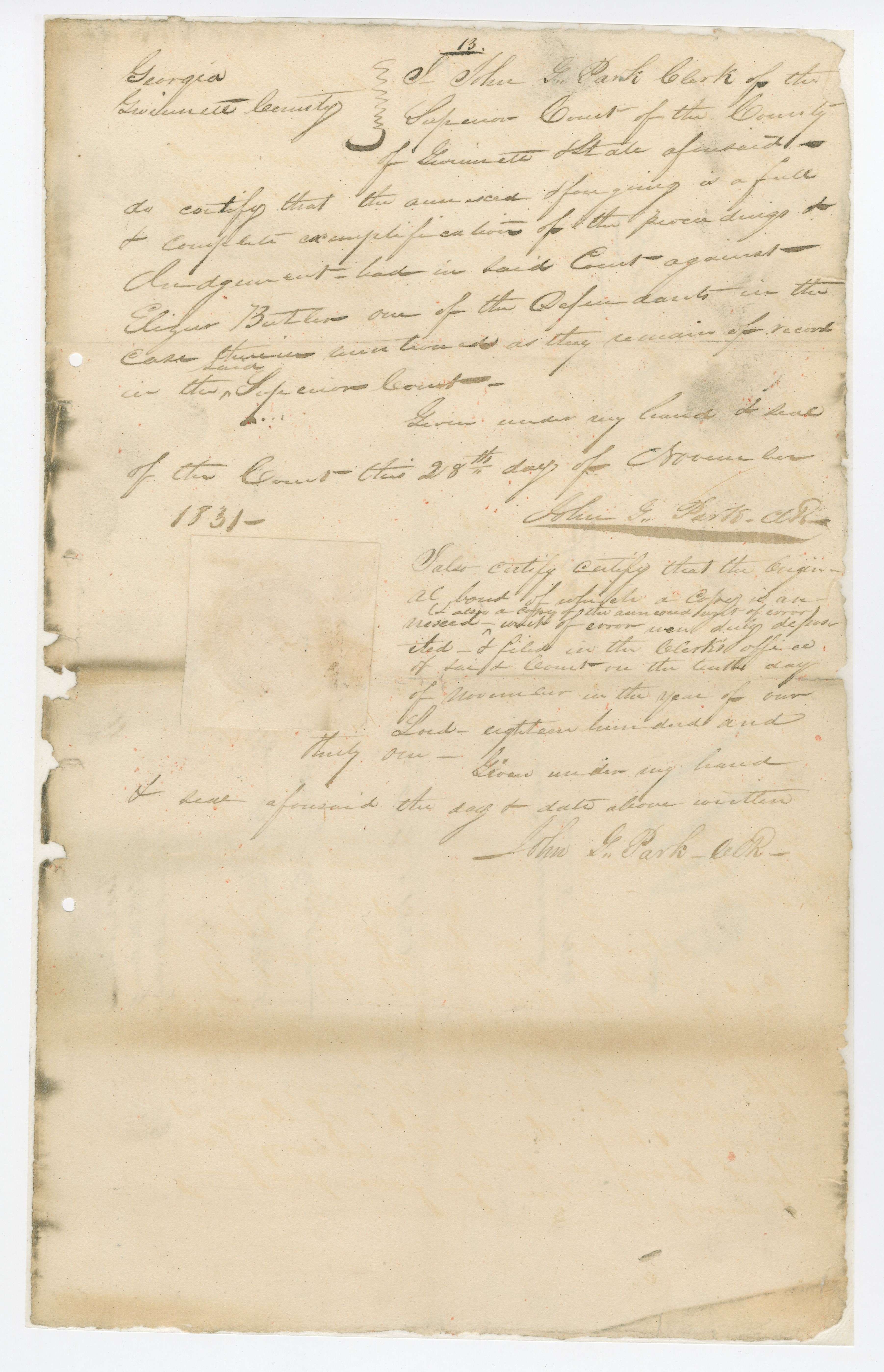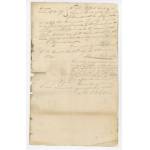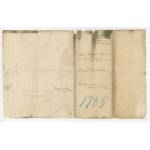Certification that a Copy of the Record Was Given to the Supreme Court
11/28/1831
Add to Favorites:
Add all page(s) of this document to activity:

Add only page 1 to activity:
Add only page 2 to activity:
This document comes from the case file for Worcester v. Georgia. The Superior Court of Gwinnett in Georgia attests that they have provided a copy of the record of the Elizur Butler v. The State of Georgia case to the U.S. Supreme Court. The Supreme Court had requested that the lower court deliver a true and full copy to Washington.
Butler and Samuel Worcester had pleaded not guilty to the charge of failing to obtain a permit or license to reside on Cherokee land. In 1830, Georgia had passed a law requiring non-Cherokee to obtain a permit from the state of Georgia to do so. A group of missionaries, including Worcester and Butler, were indicted by a grand jury after they went to live on Cherokee land in Georgia with permission from the Cherokee Nation and the U.S. Government. The Superior Court of Gwinnet in Georgia found them guilty, and sentenced them to four years of hard labor.
The men appealed. After they were unsuccessful in the highest state court, they appealed to the U.S. Supreme Court on a writ of error (which demands the lower court provide the full record to a higher court for review of errors) in Worcester v. Georgia. The Federal question raised (necessary to appeal to the U.S. Supreme Court) was whether the state of Georgia had jurisdiction, since the men were present in the territory under authority of the U.S. President doing missionary work, and with the permission of the Cherokee Nation. In other words, did the state of Georgia have the authority to hear the case or to pass laws concerning sovereign Indian nations?
The question had been asked of the Supreme Court before. In 1828, Georgia had passed a series of acts taking away rights of Cherokees residing within the state, including Cherokee removal from land that the state wanted. The Cherokee asserted that Georgia did not have the jurisdiction or authority to do these things, since the Cherokee Nation was sovereign and protected under a treaty with the United States. They sought an injunction — or order to stop what the State of Georgia was doing — from the U.S. Supreme Court in Cherokee Nation v. Georgia in 1831. The Supreme Court said they lacked jurisdiction to hear the case and it was dismissed, leaving the Cherokee at the mercy of the laws of the state of Georgia.
In Worcester v. Georgia in 1832, however, the Supreme Court ruled that states, like Georgia, could not diminish rights of tribes because the Cherokee Nation constituted a nation holding distinct sovereign powers as granted by Congress and the United States. This established the principle of "tribal sovereignty." The Court also issued a mandate to release Worcester and Butler.
Georgia ignored the ruling, however, and did not release the men. President Andrew Jackson did not intervene to enforce the Supreme Court ruling. (Georgia Governor Wilson Lumpkin pardoned Butler and Worcester in 1833.)
So the judicial branch handed down a ruling that should have freed Butler and Worcester and established more sovereignty for the tribes; but it didn't have that effect because the executive branch did not enforce it.
President Andrew Jackson had called for the relocation of eastern Native American tribes to land west of the Mississippi River, and Congress had passed the Indian Removal Act, in 1830. The Cherokee were forcibly removed from Georgia — a journey west that became known as the “Trail of Tears” because of the thousands of deaths along the way.
This document was digitized by teachers in our Primarily Teaching 2016 summer workshop in Washington, D.C.
Butler and Samuel Worcester had pleaded not guilty to the charge of failing to obtain a permit or license to reside on Cherokee land. In 1830, Georgia had passed a law requiring non-Cherokee to obtain a permit from the state of Georgia to do so. A group of missionaries, including Worcester and Butler, were indicted by a grand jury after they went to live on Cherokee land in Georgia with permission from the Cherokee Nation and the U.S. Government. The Superior Court of Gwinnet in Georgia found them guilty, and sentenced them to four years of hard labor.
The men appealed. After they were unsuccessful in the highest state court, they appealed to the U.S. Supreme Court on a writ of error (which demands the lower court provide the full record to a higher court for review of errors) in Worcester v. Georgia. The Federal question raised (necessary to appeal to the U.S. Supreme Court) was whether the state of Georgia had jurisdiction, since the men were present in the territory under authority of the U.S. President doing missionary work, and with the permission of the Cherokee Nation. In other words, did the state of Georgia have the authority to hear the case or to pass laws concerning sovereign Indian nations?
The question had been asked of the Supreme Court before. In 1828, Georgia had passed a series of acts taking away rights of Cherokees residing within the state, including Cherokee removal from land that the state wanted. The Cherokee asserted that Georgia did not have the jurisdiction or authority to do these things, since the Cherokee Nation was sovereign and protected under a treaty with the United States. They sought an injunction — or order to stop what the State of Georgia was doing — from the U.S. Supreme Court in Cherokee Nation v. Georgia in 1831. The Supreme Court said they lacked jurisdiction to hear the case and it was dismissed, leaving the Cherokee at the mercy of the laws of the state of Georgia.
In Worcester v. Georgia in 1832, however, the Supreme Court ruled that states, like Georgia, could not diminish rights of tribes because the Cherokee Nation constituted a nation holding distinct sovereign powers as granted by Congress and the United States. This established the principle of "tribal sovereignty." The Court also issued a mandate to release Worcester and Butler.
Georgia ignored the ruling, however, and did not release the men. President Andrew Jackson did not intervene to enforce the Supreme Court ruling. (Georgia Governor Wilson Lumpkin pardoned Butler and Worcester in 1833.)
So the judicial branch handed down a ruling that should have freed Butler and Worcester and established more sovereignty for the tribes; but it didn't have that effect because the executive branch did not enforce it.
President Andrew Jackson had called for the relocation of eastern Native American tribes to land west of the Mississippi River, and Congress had passed the Indian Removal Act, in 1830. The Cherokee were forcibly removed from Georgia — a journey west that became known as the “Trail of Tears” because of the thousands of deaths along the way.
This document was digitized by teachers in our Primarily Teaching 2016 summer workshop in Washington, D.C.
Transcript
GeorgiaGwinnett County
I John G. Park Clerk of the Superior Court of the County of Gwinnett & State aforesaid do certify that the announced & foregoing is a full & complete [illegible] of the proceedings & Judgment had in said Court against Elizur Butler one of the defendants in the case therein convicted as they remain of record in the ^said Superior Court.
Given under my hand & seal of the Court this 28th day of November 1831-
John G. Park, Clk
[seal]
I also certify certify that the original bond of which a copy is answered—^([illegible] copy of the answered writ of error) writ of error was duly deposited—& filed in the Clerk’s office of said Court on the tenth day of November in the year of our Lord—eighteen hundred and thirty one—
Given under my hand I seal aforesaid the day & date above written.
John G. Park Clk
No. 99
Georgia
Supr. Ct. for the County of Gwinnett within the State of
Elizur Butler Pltff. in Er.
v
The State of Georgia
Filed 6th Jany 1832
Reversed and Remanded March 3, 1832
1705 [in large blue writing]
[on left]
Exemplification & seal--$2450
Finished [written upside down]
This primary source comes from the Records of the Supreme Court.
National Archives Identifier: 38995510
Full Citation: Certification that a Copy of the Record Was Given to the Supreme Court; 11/28/1831; Appellate Case File Number 1705; Case File for Worcester v. Georgia; Appellate Jurisdiction Case Files, 1792 - 2010; Records of the Supreme Court, Record Group 267; National Archives Building, Washington, DC. [Online Version, https://docsteach.org/documents/document/worcester-v-georgia-certification-copy-record, April 26, 2024]Rights: Public Domain, Free of Known Copyright Restrictions. Learn more on our privacy and legal page.





